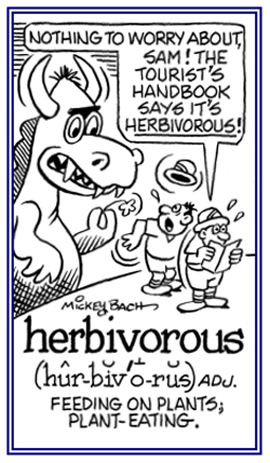vor-, vora-, -vore, -vorous, -vores, -vora, -vory
(Latin: eat, eating; consume, consuming; ingest, ingesting; devour, devouring; feeding on)

Go to this Word A Day Revisited Index
so you can see more of Mickey Bach's cartoons.
They are mostly of small size, and their molar teeth have sharp cusps. Most of the species burrow in the earth, and many of those of cold climates hibernate in winter.
The order includes the moles, shrews, hedgehogs, tanrecs (small insectivore, native of Madagascar), and allied animals, also the colugo (arboreal nocturnal mammal of southeast Asia and the Philippines).
2. An organism that feeds mainly on insects.
Although individually small, insects exist in enormous numbers and make up a very large part of the animal biomass in almost all non-marine environments.
In Queensland, Australia, pastures; for example, it is normal to have a greater total weight of Scarabaeidae larvae under the surface of the ground than of the beef cattle grazing above it.
A great many creatures depend on insects as their primary diet, and many that do not (and are thus not technically insectivores) nevertheless use insects as a protein supplement, particularly when they are breeding.
Related "eat, eating" word units: brycho-; esculent-; esophago-; glutto-; phago-.
Cross references of word families that are related directly, or indirectly, to: "food, nutrition, nourishment": alimento-; broma-; carno-; cibo-; esculent-; sitio-; tropho-; Eating Crawling Snacks; Eating: Carnivorous-Plant "Pets"; Eating: Folivory or Leaf Eaters; Eating: Omnivorous.


